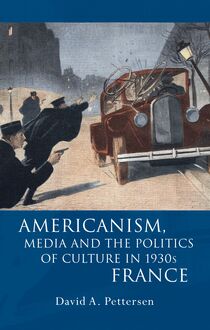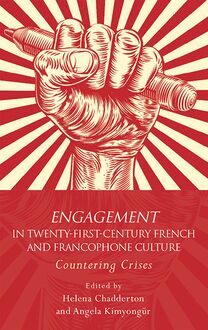Memories of May '68 , livre ebook
140
pages
English
Ebooks
2011
Vous pourrez modifier la taille du texte de cet ouvrage
Obtenez un accès à la bibliothèque pour le consulter en ligne En savoir plus
Découvre YouScribe et accède à tout notre catalogue !
Découvre YouScribe et accède à tout notre catalogue !
140
pages
English
Ebooks
2011
Vous pourrez modifier la taille du texte de cet ouvrage
Obtenez un accès à la bibliothèque pour le consulter en ligne En savoir plus
Publié par
Date de parution
15 septembre 2011
Nombre de lectures
5
EAN13
9781783164790
Langue
English
Memories of May 68 charts the emergence of the conventional representation of the French events of 1968 and argues that the dominance of this narrative, despite its limitations, stems from the convenience that such a consensus provides for those that have been pivotal in shaping the collective memory of this critical moment in French history.
Publié par
Date de parution
15 septembre 2011
EAN13
9781783164790
Langue
English
FRENCH AND FRANCOPHONE STUDIES
Memories of May 68
Series Editors
Hanna Diamond (University of Bath) Claire Gorrara (Cardiff University)
Editorial Board
Ronan le Coadic (Universit Rennes 2) Nicola Cooper (Swansea University) Didier Francfort (Universit Nancy 2) Sharif Gemie (University of Glamorgan) H. R. Kedward (Sussex University) Margaret A. Majumdar (University of Portsmouth) Nicholas Parsons (Cardiff University) Max Silverman (University of Leeds)
Memories of May 68
France s Convenient Consensus
Chris Reynolds
Chris Reynolds, 2011 Cover image: overturned cars used as barricades by rioting students blocking Gay Lussac Street, Paris, 11 May 1968 2002,TophamPicturepoint.
All rights reserved. No part of this book may be reproduced in any material form (including photocopying or storing it in any medium by electronic means and whether or not transiently or incidentally to some other use of this publication) without the written permission of the copyright owner except in accordance with the provisions of the Copyright, Designs and Patents Act 1988 or under the terms of a licence issued by the Copyright Licensing Agency Ltd, Saffron House, 6-10 Kirby Street, London, EC1N 8TS. Applications for the copyright owner s written permission to reproduce any part of this publication should be addressed to the University of Wales Press, 10 Columbus Walk, Brigantine place, Cardiff, CF10 4UP. www.uwp.co.uk
British Library Cataloguing-in-Publication Data A catalogue record for this book is available from the British Library.
ISBN 978-0-7083-2415-8 (hardback) 978-0-7083-2416-5 (paperback) e-ISBN 978-1-78316-479-0
The right of Chris Reynolds to be identified as author of this work has been asserted by him in accordance with sections 77, 78 and 79 of the Copyright, Designs and Patents Act 1988.
Contents
Series Editors Preface
Dedication
Acknowledgements
Introduction
Chapter One: The emergence of a convenient consensus
Chapter Two: 1968: consensus and disagreement
Chapter Three: Current attitudes to the events of 1968
Chapter Four: May/June 1968 and the French university system
Chapter Five: May/June 1968 in the regions
Conclusion: 2008 - Liquidate , consolidate and innovate
Appendix
Notes
Bibliography
Series Editors Preface
This series showcases the work of new and established scholars working within the fields of French and francophone studies. It publishes introductory texts aimed at a student readership, as well as research-orientated monographs at the cutting edge of their discipline area. The series aims to highlight shifting patterns of research in French and francophone studies, to re-evaluate traditional representations of French and francophone identities and to encourage the exchange of ideas and perspectives across a wide range of discipline areas. The emphasis throughout the series will be on the ways in which French and francophone communities across the world are evolving into the twenty-first century.
Hanna Diamond and Claire Gorrara
This book is dedicated to my mother, my daughter Aoife, my partner Val and to the memory of my late father.
Acknowledgements
I would like to thank the many people who have helped to complete this study, including all those involved with the distribution of the questionnaire, those who offered their time for interview and the library staff at the University of Ulster, the Biblioth que Nationale de France, the Institut National de l Audiovisuel, the Biblioth que Documentaire Internationale Contemporaine and the British Library. I would specifically like to thank Paddy McCollam for his help in the compilation of the questionnaire, Richard York for his detailed comments and advice, and, above all, my supervisor Graham Gargett, without whom this work quite simply would not have been possible, and whose guidance, dedication and entertaining comments have guaranteed my eternal gratitude. My thanks also to the Nuffield Foundation, all those involved at the University of Wales Press and my indexer Nick James.
On a more personal level I would like to thank my friends and family in France, England and Ireland for having put up with my highs and lows along the way. Special mention to my brothers David, Joseph and Paul, my sister Regina, ma belle-m re Marie-Jo, the boys from 36, my good friend Hanna Diamond and Vincent, Steph and Bruno for their warm Parisian welcomes.
Introduction
And so we are told
On 3 May 1968, in the courtyard of the Sorbonne, following a meeting held by a group of gauchiste students, the police were called amid rumours of impending violence. The students involved in the gathering were from the Nanterre faculty on the outskirts of Paris where, over the course of the previous year, tensions had been building between militant students and university authorities. Matters had taken a turn for the worse when, on 22 March 1968, radical elements occupied the administrative tower of the Nanterre faculty in protest over the arrest of a number of comrades during an anti-Vietnam protest earlier in the week. This occupation led to the creation of the mouvement du 22 mars which brought together the diverse groupuscules active on the suburban campus and included figures such as Daniel Cohn-Bendit. From this moment on, students increased their militant activity, eventually forcing the doyen to close the faculty on 2 May. This closure explains why the Nanterre students found themselves at the heart of the French university system on 3 May.
When the police moved in, the first riot of mai 68 ensued. Clashes between the forces of order and the surprisingly determined and highly mobile students set the trend for the coming week. Between 3 and 10 May - in the absence of the Prime Minister Georges Pompidou (on a state visit to Afghanistan) and amid the silence of President de Gaulle - the protest movement gathered momentum as students formulated their demands. Initially, they were outraged by the treatment doled out during and as a consequence of the 3 May riot. The imprisonment of a number of students, the occupation by the police of the Sorbonne and their omnipresence in the student Latin Quarter provided enough ammunition for what had started as a minority to gradually attract support from the wider student population. The number of participants on demonstrations grew, the level of violence was cranked up with every passing day and the movement began to see widening support from the largest student union ( Union nationale des tudiants de France (UNEF)), a university teachers union ( Syndicat national de l enseignement sup rieur (SNESup)), a movement of lyc e students ( Comit s d action lyc en (CAL)), as well as increasing sympathy from the general public. Such conditions paved the way for the pivotal Night of the barricades .
On 10 May, a huge demonstration made its way through the capital before finishing at the Latin Quarter where a decision was made to occupy the area. In order to do so, a series of barricades was built. The forces of order simply stood back and observed the construction of these defences, awaiting the order from above to move in and clear the area. In the interim period efforts were made to bring the two sides together in negotiations. The protracted talks eventually failed and the police and in particular the CRS ( Compagnies R publicaines de S curit ) were given the order to put an end to the occupation. There then ensued a terrible night of violence as students and riot police clashed until 6am. The fact that the entire evening s events were covered live by a number of radio stations meant that around the country, the general population had listened with horror to the scenes of violence. The next morning, the country awoke bleary eyed and incredulous at what had happened the night before. The perceived heavy-handed actions of the police would prove to be a significant turning point.
In protest against the events of 10 May, all the major trade unions called for a one-day strike and nationwide demonstrations for 13 May. As preparations were under way, the prime minister, upon his return, decided to concede to the demands of the students by freeing those who were imprisoned as well as pulling the police out of the Sorbonne and the Latin Quarter. If such measures were intended to blunt the impact of the planned protest, they were a failure. On 13 May (the tenth anniversary of the process that brought de Gaulle s return to power) huge demonstrations took place across the nation. Students, lyc ens , workers, farmers, politicians; all sectors of French society came out in protest at what had happened, with a reported one million marchers on the streets of Paris. The impact however, would not be limited to 13 May. From a student perspective, the day ended with their occupation of the Sorbonne. For the working class, the one-day stoppage was but the beginning of a general strike. }
General de Gaulle s decision to go ahead with a pre-planned state visit to Romania on 14 May quickly appeared to be an erroneous one, as that day saw the beginning of a series of strike movements that would confirm that this crisis was not to be limited to students. The Nantais factory Sud-Aviation was the first to call for a general strike and occupation. Other, bigger and more significant factories, including the bastion of the working class - the Renault factory at Boulogne-Billancourt - soon followed suit. By 19 May, up to two million people were on strike and de Gaulle, having cut short his state visit, was clearly perturbed with the state of affairs declaring, la r forme oui, la chienlit non . His attitude did little to stem the spread of the strike. If the sheer numbers were unprecedented, the nature of the strike and its magnitude were equally significant. They were characterized in particular by occupations. Many factories were taken over by the workers during which time they set about discussing the possibilities of a different futur














